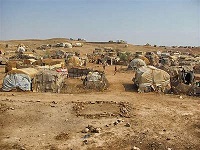By Andualem Sisay Gessesse – Since the beginning of February 2023, approximately 100 000 refugees arrived in Ethiopia from Somalia and “are in dire need of humanitarian assistance”, World Health Organization (WHO) said mentioning its support to the refugees.
Most of the refugees are women, children, unaccompanied minors, and people who are wounded or sick, according to WHO. “WHO in Ethiopia is stepping up its health response to increase access to essential health services for refugees and the host population in the Dollo Zone of Ethiopia’s Somali Region. Dollo Zone, where the refugees are currently hosted, is currently affected by the worst drought in over 40 years in the greater Horn of Africa following five consecutive failed rainy seasons,” it said in its press statement.
The severe health impact of the drought has left thousands of households’ food insecure, an increase in children with acute malnutrition, high population movement and displacement of the pastoralists in search of water, and a heightened risk of disease outbreaks. An ongoing measles outbreak in Danond district of Dollo Zone further increases the risk of spread to vulnerable populations including the refugees. The cholera outbreak has also been ongoing in Liban, a zone that hosts another group of Somali refugees.
Somali region is facing multiple disease outbreaks: the cholera outbreak with 271 cases and 17 deaths, ongoing since October 2022 in Liban, a zone that hosts another group of Somali refugees. Vaccine-preventable diseases are widespread with 5,700 cases and 119 deaths officially reported from ten of the eleven zones in the Region from January 2022 to date. Malnutrition is rampant and an average of 1,800 severely malnourished cases are admitted for treatment every week.
The overstretched health system must cater to the thousands of refugees, providing delivery services for pregnant mothers, immunization for young children, management of severe acute malnutrition, and prevention of vaccine-preventable diseases to reduce deaths. The Somali Regional Health Bureau (RHB) in collaboration with WHO, the United Nations High Commission on Refugees, and health partners is facilitating the timely health response to the refugees in the Dollo Zone.
WHO is co-chairing the health sector coordination platform in collaboration with the Somali RHB at the subnational and zonal levels, which facilitates health sector assessments, planning and response. WHO Ethiopia has delivered 12 interagency emergency health kits and severe acute malnutrition treatment kits to all the health facilities in Dollo Zone. WHO has also redeployed staff and has brought onboard more technical experts in response to the health crisis in the region.
“We will continue to advocate for deployment of more healthcare personnel and medical supplies to support the health facilities as they deal with multiple health emergencies,” says Dr Nonhlanhla Dlamini, Acting WHO Representative to Ethiopia. “There is the need for increased partner presence and robust coordination mechanisms to support the government’s response in a well-coordinated approach.” The current influx of refugees from Somalia into the Somali region of Ethiopia puts an enormous strain on the humanitarian response, which is already stretched by concurrent challenges.
To provide relief and humanitarian assistance to refugees and host communities it is estimated that USD 101 million is needed for the next nine months. WHO will need USD 5.86 million to provide health assistance and ensure the continuity of basic health services for affected communities in the Dollo Zone of Ethiopia’s Somali region.

